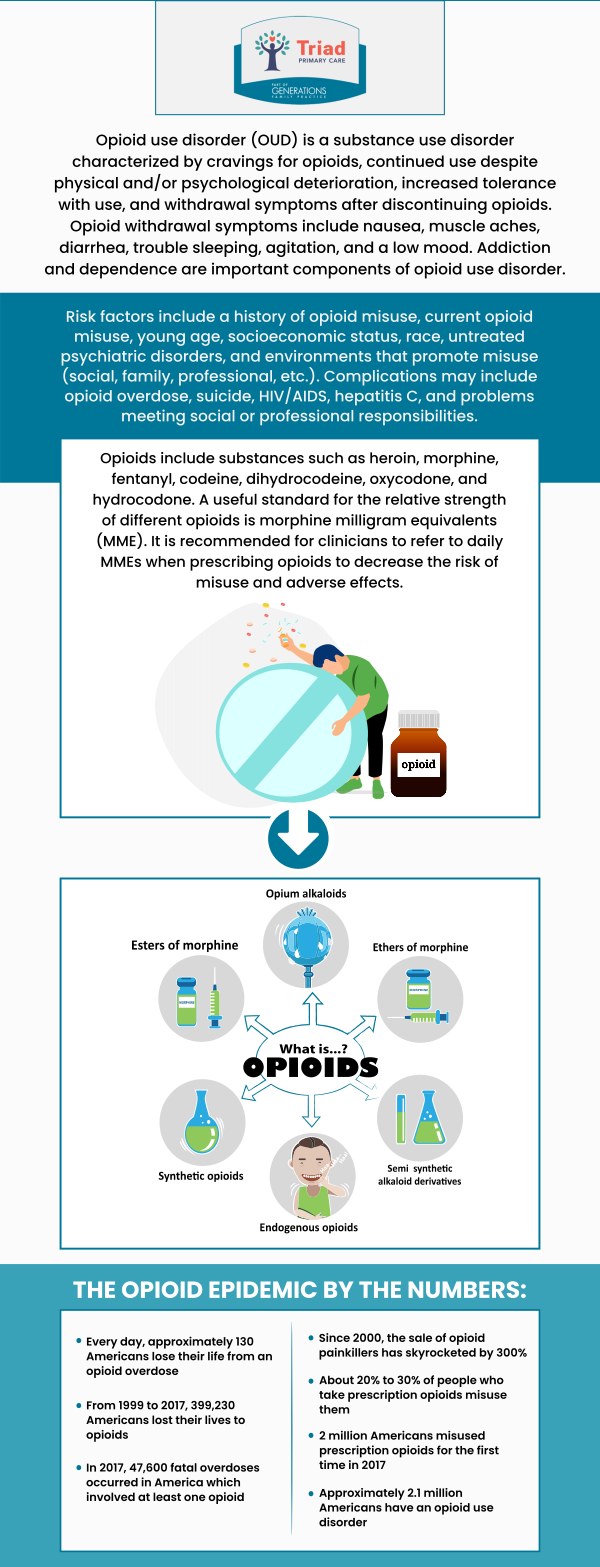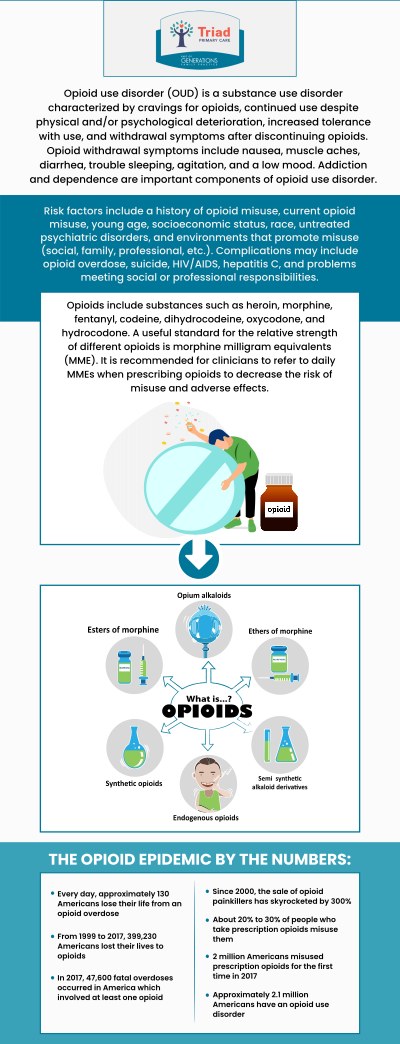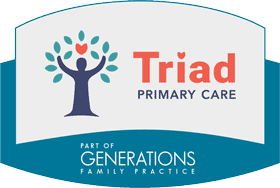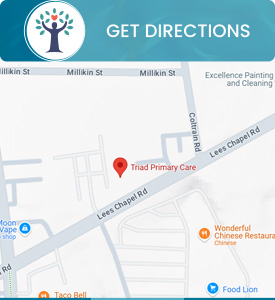8 Telltale Signs Your Loved One May Be Addicted to Opioids
If you notice changes in mood or behavior, social withdrawal, or physical symptoms like drowsiness or weight loss, these could be signs that a loved one is struggling with opioid addiction. Unexplained financial issues or secretive behavior are also key indicators. Recognizing these symptoms early can lead to timely intervention. Our team offers specialized treatment for addiction, providing essential support to help individuals on their path to recovery. For more information, contact us or book an appointment online. We are conveniently located at 1309 Lees Chapel Rd., Greensboro, NC 27455.


Opioid abuse affects millions of people in the United States, including both drug users and their families and loved ones. Identifying an addiction problem early is important for setting the stage for a successful recovery, yet many people don’t know what signs to look for.
At Triad Primary Care in Greensboro, North Carolina, our team works closely with people suffering from opioid addiction, tailoring opioid addiction treatment plans that feature safe, effective, proven methods to help each individual find a way to kick the habit. In this post, let’s look at eight signs that could mean your loved one is suffering from opioid addiction.
1. Changes in mood or behavior
Opioid addiction and other substance addiction problems directly affect the way a person behaves. The most common behavior-related signs of opioid addiction include:
- Moodiness or mood swings
- Anxiety
- Paranoia
- Anger or aggression
- Agitation or restlessness
- Depression
Sometimes, these symptoms occur gradually, or you may notice an abrupt change in behavior when the addiction becomes more severe.
2. Lack of interest in hobbies or activities
Substance abuse problems take over a person’s life, requiring more time and effort to maintain a high as the addiction progresses. People addicted to opioids frequently lose interest in activities they once enjoyed as their thoughts center more and more around their desire to obtain drugs and experience the effects. At the same time, opioids can cause tiredness or other issues that can make a person feel tired, lethargic, and disinterested in the world around them.
3. Withdrawing from friends and families
People who are addicted to opioids spend a lot of time managing their addiction. That means they spend less time with family and friends, especially since they know their loved ones wouldn’t approve of their habit. Avoiding social situations means they don’t have to deal with negative feelings about their addiction, and it also gives them more opportunities to seek out drugs and indulge in their addiction.
4. Neglecting routines
Opioid addiction causes both physical and psychological changes that can make it difficult to manage time and maintain schedules and routines at work, school, and home. As addiction progresses, your loved one may have trouble maintaining employment or sticking with their school responsibilities. Not surprisingly, these changes can cause more stress and anxiety, which in turn can feed the addiction cycle.
5. New financial problems
Opioid addiction can be an extremely expensive habit, regardless of whether your loved one is taking prescription opioids or illicit drugs. As the addiction progresses, it causes more intense cravings and a need for increasing amounts of drugs, which means your loved one needs more money to satisfy their cravings. They might ask to borrow money frequently, turn to high-interest or risky lenders, or sell personal property, even while they have a steady source of income.
6. Furtive behavior
Opioid abuse isn’t something you can do out in the open. As a result, many people who struggle with addiction must keep activities, like buying and using, a secret from friends and family members. You might notice that your loved one has unexplained extended absences, goes out late at night, or exhibits other secretive behaviors. They may be reluctant to introduce you to new friends, who may be addicts themselves.
7. Sleep changes
Opioid addiction can take a major toll on sleep habits, making it more and more difficult to get a good night’s sleep. Data show people who use opioids have a harder time staying asleep, getting restful sleep, and maintaining normal sleep cycles. Together, these factors lead to more behavioral issues and increase the risks of depression and anxiety, leading your loved one to take more drugs to deal with the lack of rest.
8. Changes in appearance or health
Over time, opioids ravage a person’s body, causing an array of health issues, along with changes in appearance. Look for signs like constipation, aches and pains, insomnia, and frequent illnesses, along with mood issues described above. Lack of interest in normal routines can lead to poor hygiene, like infrequent bathing, failing to shave or comb their hair, or wearing dirty clothing.
Don’t ignore the signs of addiction
Opioid addiction is destructive and devastating, but treatments can help. If you think your loved one is suffering from opioid addiction, Book an appointment online with Triad Primary Care today. We are conveniently located at 1309 Lees Chapel Rd., Greensboro, NC 27455. We serve patients from Greensboro NC, Browns Summit NC, McLeansville NC, Oak Ridge NC, Summerfield NC, and surrounding areas.
Check Out Our 5 Star Reviews



Additional Services You May Need
▸ Covid-19 Testing
▸ Medical Weight Loss
▸ Physical Exams
▸ Addiction Treatment
▸ Primary Care
▸ Lab Testing



